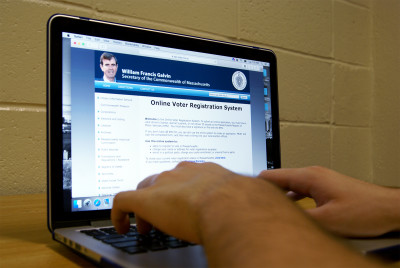
The 2014 elections saw the lowest voter registration and turnout among 18 to 29-year-olds in 40 years, according to the Center for Information and Research on Civic Learning and Engagement. With notably low turnout among young people in local elections specifically, several campus organizations and individuals are working to inform and encourage more students to be politically engaged no matter how small the election.
Only Massachusetts residents of at least 18 years of age who fulfill in-state residency for more than 183 days of a year are eligible to register to vote in Massachusetts, according to the Massachusetts Department of Motor Vehicles’ and Massachusetts Department of Revenue’s websites.
Voting eligibility requirements, among others, have made voting for out-of-state citizens living in Massachusetts more difficult, continuing the trend of low-voter turnout among college students, especially in local elections like Tuesday’s City Council races.
The Common Sense Action Club at Boston University serves to educate students about current politics and emphasize youth involvement, said Sydney Throop, a senior in BU’s College of Communication and a member of the club. Throop said the complicated voter registration process contributes to the low student voter turnout in Massachusetts.
“Many students are unsure of how voting registration works in a new state where they go to college,” Throop said. “[Students] also might be from a swing state where their vote counts more, so they choose to vote [in that state] with an absentee ballot.”
Less publicity in municipal elections, compared to statewide or nationwide elections, also adds to the low voter turnout among students, Throop said. She added it is difficult to distribute information about local elections even to students who are politically interested.
“Voting in local elections could be seen as more important than voting at a statewide or federal level,” Throop said. “Most of the decisions made by local government officials directly affect one’s everyday life.”
BU Dean of Students Kenneth Elmore agreed it is important for BU students to pay more attention to local elections, as the results will impact “how [students live] in and around Boston.”
Elmore said although registering to vote in Massachusetts is demanding, it is ultimately worth the effort. It is crucial for students to have open conversations about voting to increase turnouts among college students, he added.
“[Voting] is a long-term issue that I hope students are involved in,” Elmore said. “Start the conversation; it’s a great conversation to have about the culture of civic participation.”
Choosing not to vote in Massachusetts should not keep students from staying informed on current events, Elmore said. Although we put a lot of emphasis on voting in the United States, it is not the only way for people to be involved in politics, he said.
“I hope that people don’t think to themselves, ‘Well, because I’m not a registered voter here, I can’t contact local authorities and local officials with my suggestions and my thoughts,’” Elmore said.
Thomas Whalen, a social sciences professor in the College of General Studies, said voting cynicism among the younger generation contributes to the low student voter turnout.
“Politics seems like too exotic of an idea for students to pursue,” Whalen said. “A lot of young voters think that the system is broken and they don’t see any change happening.”
Whalen said the general lack of publicity of Election Day could also be a factor in the decline of voting students, as it often conflicts with students’ class and work schedules.
“They should make Election Day a holiday or have it on the weekends,” Whalen said. “If everyone has it off, it’ll give a huge turnout.”
Several students said a fair and complete distribution of general information on current politics is essential to increase students’ local and national political participation.
Olivia Lanman, a junior in the College of Arts and Sciences, said better political education would encourage students to vote and “make a difference.”
“It would be good to have information readily available to students,” Lanman said, “particularly about how to register to vote, how to vote in primaries, how to file an absentee ballot, et cetera.”
Rebecca Merriman, a sophomore in the Sargent College of Health and Rehabilitation Sciences, said voters need to be properly informed of all sides of the political spectrum.
“It’s important for [voters] to have the information and decide whether or not to vote,” Merriman said. “I would [vote] if unbiased information was more available about the information I’m voting on.”


















































































































